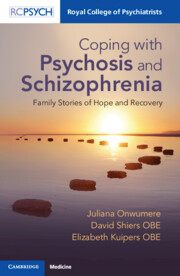77 results
2 - Parental Caregiver Accounts
-
- Book:
- Coping with Psychosis and Schizophrenia
- Published online:
- 16 May 2024
- Print publication:
- 23 May 2024, pp 13-43
-
- Chapter
- Export citation
Epigraph
-
- Book:
- Coping with Psychosis and Schizophrenia
- Published online:
- 16 May 2024
- Print publication:
- 23 May 2024, pp v-vi
-
- Chapter
- Export citation
Preface
-
- Book:
- Coping with Psychosis and Schizophrenia
- Published online:
- 16 May 2024
- Print publication:
- 23 May 2024, pp xi-xiv
-
- Chapter
- Export citation
3 - Partner Caregiver Accounts
-
- Book:
- Coping with Psychosis and Schizophrenia
- Published online:
- 16 May 2024
- Print publication:
- 23 May 2024, pp 44-47
-
- Chapter
- Export citation
Acknowledgements
-
- Book:
- Coping with Psychosis and Schizophrenia
- Published online:
- 16 May 2024
- Print publication:
- 23 May 2024, pp xv-xvi
-
- Chapter
- Export citation
4 - Sibling Caregiver Accounts
-
- Book:
- Coping with Psychosis and Schizophrenia
- Published online:
- 16 May 2024
- Print publication:
- 23 May 2024, pp 48-63
-
- Chapter
- Export citation
About the Authors
-
- Book:
- Coping with Psychosis and Schizophrenia
- Published online:
- 16 May 2024
- Print publication:
- 23 May 2024, pp ix-x
-
- Chapter
- Export citation
5 - Child Caregiver Accounts
-
- Book:
- Coping with Psychosis and Schizophrenia
- Published online:
- 16 May 2024
- Print publication:
- 23 May 2024, pp 64-72
-
- Chapter
- Export citation
Index
-
- Book:
- Coping with Psychosis and Schizophrenia
- Published online:
- 16 May 2024
- Print publication:
- 23 May 2024, pp 86-94
-
- Chapter
- Export citation
Contents
-
- Book:
- Coping with Psychosis and Schizophrenia
- Published online:
- 16 May 2024
- Print publication:
- 23 May 2024, pp vii-viii
-
- Chapter
- Export citation
Reviews
-
- Book:
- Coping with Psychosis and Schizophrenia
- Published online:
- 16 May 2024
- Print publication:
- 23 May 2024, pp ii-ii
-
- Chapter
- Export citation
Copyright page
-
- Book:
- Coping with Psychosis and Schizophrenia
- Published online:
- 16 May 2024
- Print publication:
- 23 May 2024, pp iv-iv
-
- Chapter
- Export citation
References
-
- Book:
- Coping with Psychosis and Schizophrenia
- Published online:
- 16 May 2024
- Print publication:
- 23 May 2024, pp 82-85
-
- Chapter
- Export citation
Helpful Resources
-
- Book:
- Coping with Psychosis and Schizophrenia
- Published online:
- 16 May 2024
- Print publication:
- 23 May 2024, pp 81-81
-
- Chapter
- Export citation
6 - Extended Family Caregiver Account
-
- Book:
- Coping with Psychosis and Schizophrenia
- Published online:
- 16 May 2024
- Print publication:
- 23 May 2024, pp 73-75
-
- Chapter
- Export citation
7 - Summary and Conclusions
-
- Book:
- Coping with Psychosis and Schizophrenia
- Published online:
- 16 May 2024
- Print publication:
- 23 May 2024, pp 76-80
-
- Chapter
- Export citation

Coping with Psychosis and Schizophrenia
- Family Stories of Hope and Recovery
-
- Published online:
- 16 May 2024
- Print publication:
- 23 May 2024
Catching the threads: caregiving in Alzheimer's disease
-
- Journal:
- The British Journal of Psychiatry / Volume 223 / Issue 5 / November 2023
- Published online by Cambridge University Press:
- 01 November 2023, pp. 507-508
- Print publication:
- November 2023
-
- Article
-
- You have access
- Open access
- HTML
- Export citation
Sexual abuse and psychotic phenomena: a directed acyclic graph analysis of affective symptoms using English national psychiatric survey data – ERRATUM
-
- Journal:
- Psychological Medicine / Volume 53 / Issue 16 / December 2023
- Published online by Cambridge University Press:
- 04 August 2023, p. 7994
-
- Article
-
- You have access
- Open access
- HTML
- Export citation
Sexual abuse and psychotic phenomena: a directed acyclic graph analysis of affective symptoms using English national psychiatric survey data
-
- Journal:
- Psychological Medicine / Volume 53 / Issue 16 / December 2023
- Published online by Cambridge University Press:
- 24 July 2023, pp. 7817-7826
-
- Article
-
- You have access
- Open access
- HTML
- Export citation



